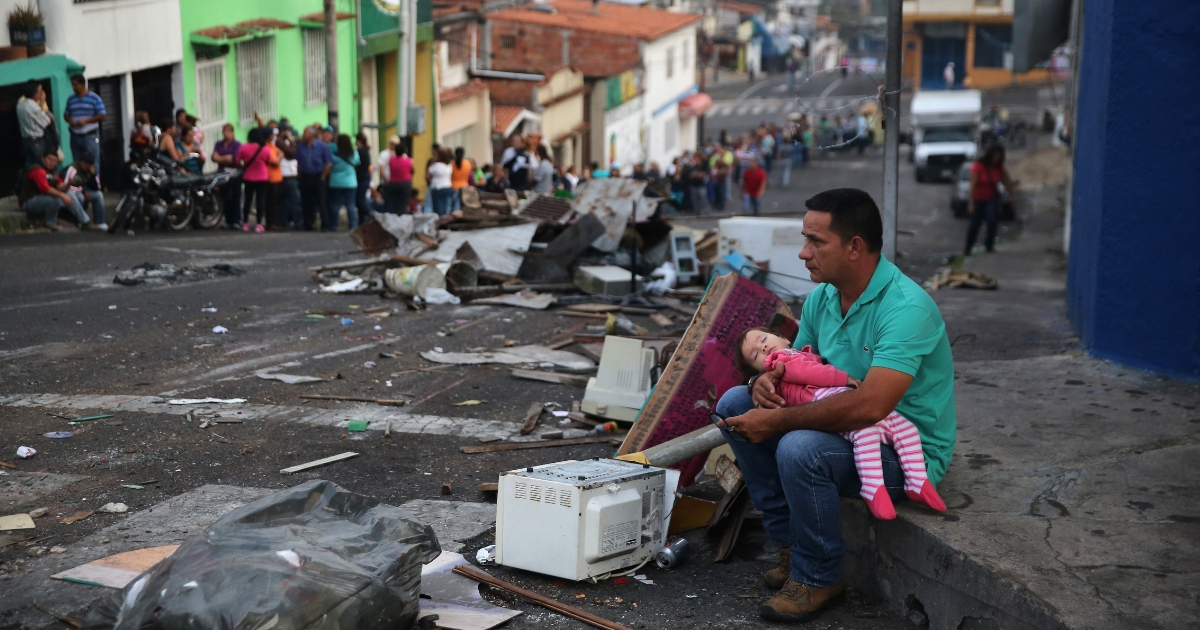
Almost Half of Venezuela's Stores Close After Socialists Win Huge Min Wage Hike
The already-rocky Venezuelan economy is nearer to collapse after President Nicolás Maduro raised the nation’s minimum wage by 3,500 percent, triggering runaway inflation and mass closings of Venezuelan businesses.
Nearly 40 percent of all Venezuelan stores have closed, some forever, according the National Council of Commerce and Services of Venezuela.
“It is a perfect storm,” said María Carolina Uzcátegui, president of the council, according to the Miami Herald. “These decisions are leading many business people to say, ‘No, I can’t do it any more.’”
She said government edicts require businesses to sell below cost while employee salaries are skyrocketing.
“We have inspections, and they force us to sell at last month’s prices,” she said. “That takes money away from the business because of the hyperinflation, when you can’t even sell at yesterday’s prices because you lose money.”
She said arguing with the government is a one-way trip to prison.
“And anyone who protests against these measures runs the risk of going to jail, without the right to appeal, without the right to anything, simply because the official whose turn it was to inspect the store just felt like arresting you. He did it, and that’s all,” she said.
Inflation is nothing new to Venezuela. The August rate set a new national record as 225 percent, and the current estimate is that inflation for 2018 will hit a rate of 1 million percent, The Washington Post reported.
Ricardo Cusanno, vice president of Fedecamaras, the main business federation in Venezuela, called the government economic policies “the worst of all possible worlds.”
“Maduro raised the (minimum) salary, which was necessary, but announced a series of punitive measures that create no incentive for investment and no trust, and are set to decrease production.”
Maduro has promised to right the nation’s economy, but it keeps getting worse.
“I have never seen an economic plan fail so miserably so fast,” said Victor Maldonado, former director of the Venezuelan Chamber of Commerce, who said over the past 20 years, 75 percent of the country’s private companies closed.
“Of the 140,000 left, I’m afraid that we’ll count by thousands the ones that will close after these measures,” he said.
Economist Orlando Ochoa said the system conspires against small businesses.
“The government sector has the monopoly on imports, the currency market is dysfunctional and there’s hyperinflation,” said Ochoa. “So, if salaries are increased by decree, and the commercial and industrial sectors cannot sell their products because of these problems, and on top of that because of electricity blackouts, infrastructure problems and the loss of qualified personnel, which is leaving the country, then it’s easy to understand that many may prefer to close.”
Francisco Ibarra, director of the Econometrica company, said the wage increase was not a standalone action, but the straw that broke the backs of many companies.
“If you already have a demand that has been falling across all Venezuelan sectors, and you have this kind of increase in salary, and then you don’t have any way of adding these costs to the prices, and you also don’t have access to bank financing, and the company already was not generating significant profits, it’s obvious then that what’s happening is that the company is dying,” said Ibarra.
In #Venezuela, a kilo of dog food costs three weeks' salary for a minimum wage employee. Barely able to feed themselves, Venezuelans are releasing their pets, flooding the streets with abandoned dogs. #Socialism isn’t even suited for dogs. https://t.co/PxYJ0AIuwN
— Steve Hanke (@steve_hanke) September 16, 2018
As the economy teeters, talk of military action is rife.
Organization of American States Secretary General Luis Almagro on Friday said military action might be the only way to end Maduro’s socialist “dictatorship.”
“With respect to a military intervention to overthrow Nicolas Maduro’s regime, I don’t think any option should be ruled out,” Almagro said, according to ABC.
“What Nicolas Maduro’s regime is perpetrating are crimes against humanity, the violation of the human rights and the suffering of people that is inducing an exodus. Diplomatic actions should be the first priority but we shouldn’t rule out any action.”
CORRECTION: As originally published, this article stated that inflation for 2017 was expected to hit 1 million percent. That is the prediction for 2018, and we have corrected the text accordingly. We apologize for the error.
Truth and Accuracy
We are committed to truth and accuracy in all of our journalism. Read our editorial standards.
Advertise with The Western Journal and reach millions of highly engaged readers, while supporting our work. Advertise Today.












